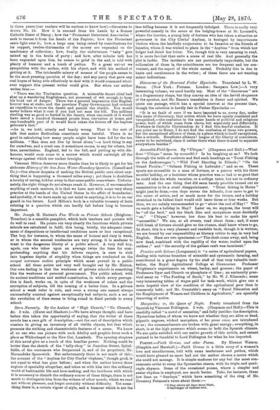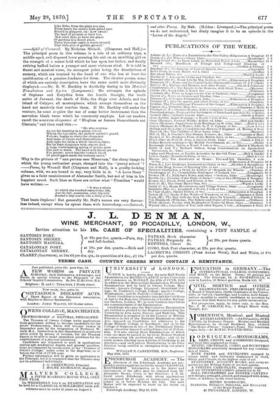(Simpkin and Marshall.)—Faith Grosme is a little story of a
woman's love and steadfastness, told with some tenderness and pathos, which would have pleased us more had not the author chosen a metre which she amid not manage. It is simple madness for any but the most con-
summate artist to essay the Spenserian stanza, with its triple and quad- ruple rhymes. Some of the occasional poems, where a simpler and easier rhythm is employed, are much 'better. Take, for instance, these few lines on "Sundays," which have something of the ring of Mr.
Coventry Patmore's verse about them :—
"0 Day above all days most blest, 0 harbinger of endless rest,
Like Nebo, from the plain you rise, From hence the saint's faith-gifted eyes Behold in glimpses, oh ! how sweet! The land of promise at their feet. 'Mid other days ye have the grace Of gardens in a desert place. There blossoms smile, a waste around, That little plot of garden ground."
Sybil of Cornwall. By Nicholas Michell. (Chapman and Hall.)— The principal poem in this volume is a tale of an ordinary type, a middle-aged, evil disposed lover pressing his suit on an unwilling girl on the strength of a secret hold which be has upon her father, and finally retiring baffled before a younger and morn virtuous rival. It is told in fluent and musical verse, its strongest point being the descriptions of scenery, which are touched by the hand of one who has at least the qualification of a genuine fondness for them. The shorter poems, some of which are entirely descriptive, have the same merit more distinctly displayed.—Mr. R. W. Buckley is decidedly daring in his Metrical Translations and Lyrics. (Longmans.) He attempts the episode of Orpheus and Eurydice from the fourth Georgic, the tenth satire of Juvenal, the death of Dido, the dirge over Adonis, and the island of Calypso, all masterpieces, which avenge themselves on the hand not masterly that touches them. If Mr. Buckley will make the venture, he must acquire the use of some better instrument than the nerveless blank verse which he commonly employs. Let our readers recall the sonorous eloquence of "Elogium an famam Demosthenis aut Cieronis," and then read this :— "He who receives
As yet his learning in a penny school, Whom the boy-slave, the narrow satchel's guard, Follows, begins to crave the eloquence And fame of Cicero and Demosthenes.
And sighs for them a whole vacation-time; But by their eloquence both orators died, A large o'erbrimming spring of genius gave The pair to death. The hand and throat are cut For genius; never has the coward blood Of pettifoggers made the rostrum moist."
Why is the picture of " uno partam twee Minervam," the cheap image to which the young enthusiast prays, changed into the "penny school "? —Poems, by Wraxall Hall (Chapman and Hall), is a goodly-looking volume, with, we are bound to say, very little in it. "A Love Story" gives us a faint reminiscence of Alexander Smith, bat not of him in his happiest mood. Such lines as these are rather what " Firmilian " would have written :—
" It was a strain At which the rosebud started into life, And the fair, passionless, while Itly-bells Blushed a deep scarlet, like a thing of lore.
That beats Orpheus ! But generally Mr. Hall's versos are very flavour- less indeed, except when he spices them with heterodoxy.—Satarah,
and other Poems. By Mab. (Holden: Liverpool.)—The principal poem we do not understand, but dimly imagine it to be an episode in the "Loves of the Angels."































 Previous page
Previous page